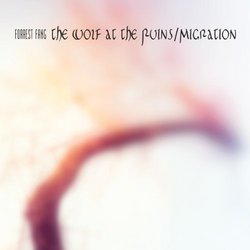| All Artists: Forrest Fang Title: Wolf at Ruins/Migration (Speci Members Wishing: 3 Total Copies: 0 Label: Projekt Records Release Date: 8/13/2013 Genres: Dance & Electronic, New Age, Pop Style: Number of Discs: 1 SwapaCD Credits: 1 UPC: 617026029023 |
Search - Forrest Fang :: Wolf at Ruins/Migration (Speci
 | Forrest Fang Wolf at Ruins/Migration (Speci Genres: Dance & Electronic, New Age, Pop
Limited to 300 copies — "Fang's compositional stylings applied to the genre of space music with exceptional results." Billboard — Projekt opens the archives to bring back two formative ambient works. Originally released in 1... more » |
Larger Image |
CD Details
Synopsis
Product Description
Limited to 300 copies
"Fang's compositional stylings applied to the genre of space music with exceptional results." Billboard
Projekt opens the archives to bring back two formative ambient works. Originally released in 1989 and 1986 respectively, The Wolf At The Ruins and Migration have been out of print for over 20 years. They're from the period when he began his own fusion of electronics and traditional non-Western instruments into a modernist blend of electronics, ambient and world music. Re-released with two bonus tracks per album, and remastered by Robert Rich, this limited edition 2-CD reissue of 300 copies is the definitive way to experience Fang's early visionary blend of space music, hypnotic minimalism and earthy polyrhythms with a Far Eastern bent.
Originally released on Fang s cryptically named Ominous Thud label, these releases incorporate tape delay techniques first popularized by ambient pioneers Robert Fripp and Terry Riley, combined with a broadening palette of influences from non-Western folk music to ambient music to progressive rock. The Wolf At The Ruins, released in 1989, was a particularly significant album for Fang that brought him to greater prominence with extensive airplay on nationally syndicated radio show such as Music From the Hearts of Space and Echoes.
"These albums were really a turning point for me, musically," says Fang. "With my exposure to traditional Chinese music and other non-Western forms such as Balinese gamelan, I was seeing and hearing new colors and textures that seem to form their own sound and language, maybe just a bit beyond my grasp but close enough for me to preserve the essence of what I was experiencing."
"Fang's compositional stylings applied to the genre of space music with exceptional results." Billboard
Projekt opens the archives to bring back two formative ambient works. Originally released in 1989 and 1986 respectively, The Wolf At The Ruins and Migration have been out of print for over 20 years. They're from the period when he began his own fusion of electronics and traditional non-Western instruments into a modernist blend of electronics, ambient and world music. Re-released with two bonus tracks per album, and remastered by Robert Rich, this limited edition 2-CD reissue of 300 copies is the definitive way to experience Fang's early visionary blend of space music, hypnotic minimalism and earthy polyrhythms with a Far Eastern bent.
Originally released on Fang s cryptically named Ominous Thud label, these releases incorporate tape delay techniques first popularized by ambient pioneers Robert Fripp and Terry Riley, combined with a broadening palette of influences from non-Western folk music to ambient music to progressive rock. The Wolf At The Ruins, released in 1989, was a particularly significant album for Fang that brought him to greater prominence with extensive airplay on nationally syndicated radio show such as Music From the Hearts of Space and Echoes.
"These albums were really a turning point for me, musically," says Fang. "With my exposure to traditional Chinese music and other non-Western forms such as Balinese gamelan, I was seeing and hearing new colors and textures that seem to form their own sound and language, maybe just a bit beyond my grasp but close enough for me to preserve the essence of what I was experiencing."

 Track Listings (9) - Disc #1
Track Listings (9) - Disc #1